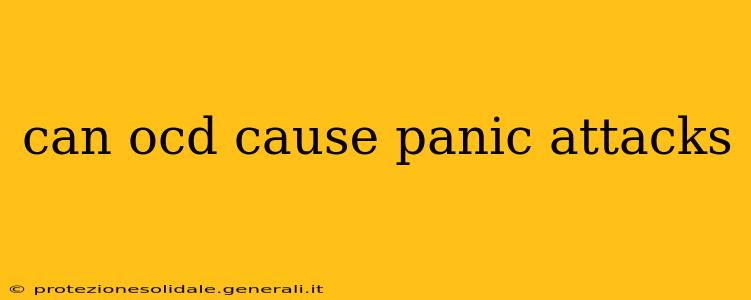Obsessive-compulsive disorder (OCD) and panic attacks often coexist, leading many to wonder about their relationship. While not all individuals with OCD experience panic attacks, and not all panic attacks stem from OCD, there's a significant correlation that warrants understanding. This article explores the connection between OCD and panic attacks, addressing common questions and offering insights into management strategies.
What is OCD?
Obsessive-compulsive disorder (OCD) is an anxiety disorder characterized by recurring, unwanted thoughts (obsessions) and repetitive behaviors (compulsions) performed to reduce anxiety caused by those thoughts. These obsessions can range from concerns about contamination and order to intrusive thoughts about harming oneself or others. Compulsions are actions taken to alleviate the anxiety triggered by these obsessions, such as excessive handwashing, checking, or counting. The key is that these obsessions and compulsions are time-consuming and significantly interfere with daily life.
What is a Panic Attack?
A panic attack is a sudden episode of intense fear that may feel like a heart attack. Symptoms can include a racing heart, sweating, trembling, shortness of breath, chest pain, nausea, dizziness, and feelings of impending doom or losing control. These attacks can occur unexpectedly or be triggered by specific situations or thoughts. Panic attacks are often associated with panic disorder, another anxiety disorder where individuals experience recurrent and unexpected panic attacks.
Can OCD Obsessions Trigger Panic Attacks?
Yes, OCD obsessions can absolutely trigger panic attacks. The intense anxiety generated by persistent, intrusive thoughts can overwhelm some individuals, leading to a full-blown panic attack. For example, someone with contamination obsessions might experience a panic attack after touching a doorknob, fueled by the fear of contamination and the inability to effectively neutralize that perceived threat through their compulsions. The perceived inability to control the obsessive thoughts themselves can also fuel intense anxiety and a subsequent panic attack.
Can OCD Compulsions Prevent Panic Attacks?
While compulsions offer temporary relief from the anxiety of obsessions, they don't address the root cause and can paradoxically contribute to the cycle of anxiety and panic. The short-term anxiety reduction achieved through compulsive behaviors can reinforce these behaviors, making them harder to break. Furthermore, the constant engagement in compulsions can be exhausting and even increase overall stress levels, indirectly increasing the risk of panic attacks. It's a vicious cycle.
How Are OCD and Panic Attacks Treated?
Treatment for both OCD and panic attacks often involves a combination of therapy and medication.
Therapy:
- Cognitive Behavioral Therapy (CBT): CBT is a highly effective therapy for both OCD and panic disorder. It helps individuals identify and challenge negative thought patterns and develop coping mechanisms for managing anxiety. Exposure and response prevention (ERP), a specific type of CBT, is particularly effective for OCD, gradually exposing individuals to their feared situations or objects while preventing them from engaging in compulsions.
- Acceptance and Commitment Therapy (ACT): ACT focuses on accepting difficult thoughts and feelings without judgment and committing to valued actions. This approach can be particularly helpful in managing the anxiety associated with both OCD and panic attacks.
Medication:
- Selective Serotonin Reuptake Inhibitors (SSRIs): SSRIs are often prescribed to manage both OCD and panic disorder. They work by increasing serotonin levels in the brain, which helps regulate mood and anxiety.
- Other Medications: Other medications, such as benzodiazepines (for short-term panic relief), may be used in conjunction with therapy, but are generally not a long-term solution.
How Common Is It for OCD to Cause Panic Attacks?
The frequency with which OCD triggers panic attacks varies greatly among individuals. Some individuals may experience panic attacks frequently, while others may only experience them occasionally or not at all. The severity of OCD symptoms, individual coping mechanisms, and other contributing factors all play a role.
What are the differences between anxiety caused by OCD and panic disorder?
While both OCD and panic disorder involve anxiety, their core characteristics differ. OCD's anxiety centers on intrusive thoughts and the need to perform compulsions, while panic disorder focuses on recurrent, unexpected panic attacks. A person can experience both conditions concurrently.
Conclusion
The relationship between OCD and panic attacks is complex but significant. Understanding this relationship is crucial for effective treatment. If you suspect you are struggling with either OCD or panic attacks, seeking professional help from a mental health professional is essential for developing an individualized treatment plan tailored to your specific needs. Early intervention is key to managing these conditions and improving quality of life. Remember, you're not alone, and effective treatment is available.
